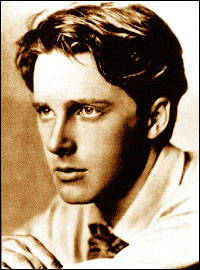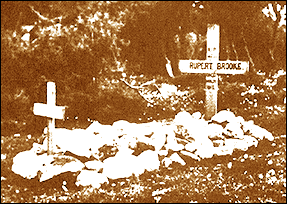
Rupert Brooke (1887-1915) |
Poetry on Peace Rupert Brooke (1887-1915):
Peace & The Soldier (1914)
|
|
PEACE
Now, God be thanked Who has matched us with His hour, The War Sonnets: I. Peace (1914) *************************************** THE SOLDIER
If I should die, think only this of me: The War Sonnets: V. The Soldier (1914) ***************************************
SONNET
Not with vain tears, when we're beyond the sun, The South Seas: 12. Sonnet (1914)
Rupert Brooke (1887-1915), |
 Notes: Brooke was born at Rugby, August 3, 1887. A Fellow of King's College, Cambridge (1913).
He went on the Antwerp Expedition (Oct. 1914), and sailed with the British Mediterranean Expeditionary
Force (Feb. 28, 1915). He died in the Aegean on April 23, 1915. George Edward Woodberry writes in his
introduction to The Collected Poems of Rupert Brooke (1915): "There is a grave in Scyros,
amid the white and pinkish marble of the isle, the wild thyme and the poppies, near the green and
blue waters. There Rupert Brooke was buried. Thither have gone the thoughts of his countrymen,
and the hearts of the young especially. It will long be so. For a new star shines in the English heavens."
Margaret Lavington's biographical note of Brooke
(London, October 1915) mentions that an appreciation appeared in the London Times after Brooke's
death by W.S.C.: "the poet-soldier told with all the simple force of genius the sorrow of youth about
to die, and the sure, triumphant consolations of a sincere and valiant spirit. He expected to die;
he was willing to die for the dear England whose beauty and majesty he knew; and he advanced toward
the brink in perfect serenity, with absolute conviction of the rightness of his country's cause and
a heart devoid of hate for fellowmen." W.S.C. was
Winston Spencer Churchill, a personal friend and warm admirer of the poet. It's interesting how
Brooke's poems of WW I inspired Churchill's courageous leadership as British Prime Minister some
25 years later during World War II. Such is the enduring flame of poetry that nourishes the human
spirit which William Faulkner proclaims as "the poet's duty whose voice helps mankind endure and prevail".
(1950 Nobel Lecture)
Notes: Brooke was born at Rugby, August 3, 1887. A Fellow of King's College, Cambridge (1913).
He went on the Antwerp Expedition (Oct. 1914), and sailed with the British Mediterranean Expeditionary
Force (Feb. 28, 1915). He died in the Aegean on April 23, 1915. George Edward Woodberry writes in his
introduction to The Collected Poems of Rupert Brooke (1915): "There is a grave in Scyros,
amid the white and pinkish marble of the isle, the wild thyme and the poppies, near the green and
blue waters. There Rupert Brooke was buried. Thither have gone the thoughts of his countrymen,
and the hearts of the young especially. It will long be so. For a new star shines in the English heavens."
Margaret Lavington's biographical note of Brooke
(London, October 1915) mentions that an appreciation appeared in the London Times after Brooke's
death by W.S.C.: "the poet-soldier told with all the simple force of genius the sorrow of youth about
to die, and the sure, triumphant consolations of a sincere and valiant spirit. He expected to die;
he was willing to die for the dear England whose beauty and majesty he knew; and he advanced toward
the brink in perfect serenity, with absolute conviction of the rightness of his country's cause and
a heart devoid of hate for fellowmen." W.S.C. was
Winston Spencer Churchill, a personal friend and warm admirer of the poet. It's interesting how
Brooke's poems of WW I inspired Churchill's courageous leadership as British Prime Minister some
25 years later during World War II. Such is the enduring flame of poetry that nourishes the human
spirit which William Faulkner proclaims as "the poet's duty whose voice helps mankind endure and prevail".
(1950 Nobel Lecture)
|
| Top of Page | Contents | Resources | Art | Books | Essays | Exhibits | Music |
| Nobel Peace Prize | Philosophy | Poetry | Quotes | A-Z Portals | Home |
| © Peter Y. Chou, WisdomPortal.com P.O. Box 390707, Mountain View, CA 94039 email: peter@wisdomportal.com (3-14-2003) |
 |